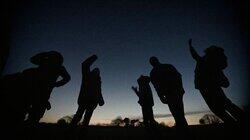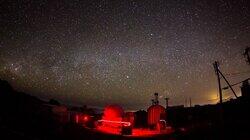The Sky at Night - Season 64 / Year 2020

Season 64 / Year 2020

Episodes

A Beginner's Guide
The Sky at Night team go back to basics to show you how to enjoy the night sky, wherever you are. It doesn't matter if you live in a city or in the countryside, if you have a telescope, a pair of binoculars or just your eyes to look with.
Pete explains why the night sky changes and joins a group of novice stargazers to talk about the best ways to introduce newcomers to the night. Chris ventures onto a roof in Oxford and marvels at the moon through binoculars, and Maggie goes back to her childhood telescope-making class to talk basic telescope essentials.
Curious about the night sky but don't know where to start? Want to know how to make the most of your new telescope? This is the programme for you!

Here Comes the Sun
Esa's solar orbiter was launched from Cape Canaveral earlier this year on a decade long mission to discover the secrets of our sun. And the Sky at Night was there to capture all the action. Two aspects of this mission make it unique. First, the spacecraft is designed to capture the highest resolution images of the sun ever taken. And then it will orbit the sun to give us a glimpse of what's happening at the its poles, areas we have never seen before.
In this programme, we discover just how this spacecraft was built, how it will protect itself against the sun's searing heat and how it will investigate the mysteries of the sun with a suite of ten instruments designed and built across 17 European countries.

Locked Down but Looking Up
The Sky at Night celebrates its 800th episode while filming takes place under the coronavirus lockdown.
Chris Lintott explores how some astronomers are managing to continue making observations by controlling telescopes as far away as Hawaii from a laptop in their bedrooms in Belfast. Maggie Aderin-Pocock investigates how members of the public can get involved in analysing data from Mars, even when they are confined to their homes. And Pete Lawrence points out some treats in the night sky that we can all see if we keep looking up even when we're locked down.
Plus a treat from the archives of the last 799 episodes set to a specially commissioned new arrangement of the show's famous theme tune.

Different Planet, Different Sky
The Sky at Night team explore a changing world. Maggie Aderin-Pocock interviews astronaut Jessica Meir, who returned from 205 days on the International Space Station to a world she barely recognised. They also discuss Jessica's experiments in micro-gravity, growing lettuce in space and the first all-female spacewalk.
Chris Lintott meets the astronomer who recently announced the discovery of the closest black hole to Earth. Pete Lawrence photographs the dark side of Venus and Lucie Green investigates whether Elon Musk's constellation of Starlink satellites are ruining the night sky.

Stars - A Matter of Life and Death
The Sky at Night team explore the life and death of stars. Chris Lintott investigates the strange dimming of Betelgeuse, which caused some speculation that it might be about to explode into a supernova. And Maggie Aderin-Pocock reports on the recent discovery of the biggest and brightest supernova ever observed.
Lucie Green discovers how historical drawings that pre-date the invention of the telescope are helping us to predict solar activity, and Pete attempts to photograph our very own star, the Sun.
The team also pay tribute to pioneering astronomer Margaret Burbidge, who died on 5 April 2020 at the age of 100, whose work led to the understanding that we are all made of stardust.

Mars: Planet of Dreams
Mars has fascinated us ever since we first looked up to the heavens. We have imagined alien civilisations, exotic life forms and even dreamed of travelling there ourselves. But after the first probes flew past the Red Planet, and with each subsequent mission that has orbited or landed on its surface, that vision has changed. We have come to realise that the planet is, most likely, dead. But that hasn't dimmed our hopes for finding evidence of past life. And our desire to travel there and colonise the Red Planet still endures.
From the very beginning of this exploration, the BBC has recorded our shifting perception of Mars. Since the Sky at Night started broadcasting in 1957, there have been over 50 episodes devoted to Mars and more than ten episodes of Horizon. This programme looks back at that coverage.

Life on Venus
The Sky at Night gains exclusive access to the team of scientists behind the recent discovery of possible signs of life on Venus. Recorded in secret before the news broke, the film reveals the story behind this extraordinary piece of scientific discovery.

Beyond the Visible
How vision-impaired astronomers are able to see the universe.

Life Beyond Venus
Chris and Maggie report on the reaction to the dramatic announcement of the discovery of phosphine gas in the clouds of Venus, a gas that could be a sign of life.

The State of Astronomy
Chris Lintott and Maggie Aderin-Pocock consider the state of astronomy in 2020 and wonder what new, exciting discoveries await across the rest of the decade.
Recently Updated Shows

The Creep Tapes
Based on a collection of videotapes in the secret vault of the world's deadliest and most socially uncomfortable serial killer, who hires his victims to film him for the day under false pretenses, each episode exposes a new victim from one of the fabled 'Creep Tapes'.

America's Funniest Home Videos
ABC's longest-running primetime entertainment show, America's Funniest Home Videos, returns for season 36 this fall with the same mission -- giving families something genuinely funny to enjoy together on Sunday nights.
"AFV," the longest-running primetime entertainment show in ABC history, returns for season 36 with the same mission - to provide viewers with hysterical moments that fly by at a dizzying pace.

The Real Housewives of Potomac
Just up the river from our nation's capital lies a hidden gem—Potomac, Maryland. Its rolling hills, gated mansions, sophisticated prep schools, and exclusive country clubs all serve to keep the area invitation-only. Sprinkled throughout this community are a handful of old-line, wealthy African-American families who have historically broken racial barriers to provide a life of privilege for their children. The Real Housewives of Potomac follows the upscale lives of six intriguing, well-to-do women: Gizelle Bryant, Katie Rost, Karen Huger, Charrisse Jackson-Jordan, Robyn Dixon, and Ashley Darby, all of whom have fought for their places in this society by way of legacy or marriage. In a town where entry is granted only through class, pedigree, and lineage, how far will these ladies go to secure their spot at the top of this prestigious circle?

The Traitors Canada
Follow a group of contestants – including some familiar faces – who live together as they complete a series of challenges with the goal of earning a cash prize. The catch? Some of the contestants are traitors who will attempt to deceive and manipulate their way to the prize instead of sharing it amongst the group. In this psychological adventure will the traitors be unmasked in time?
